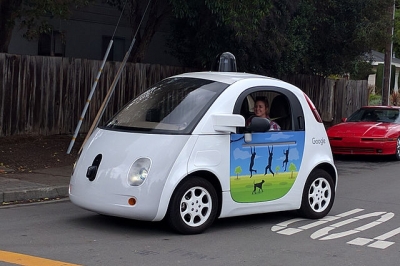
Many citizens and taxpayers are not yet sure how they feel about autonomous vehicles. In spite of that, it’s obvious that motorists and pedestrians might as well get ready. The trend is set. Autonomous vehicles will be common on America’s roadways in the not-too-distant future.
Autonomous vehicles of all types will be available. Buses and mass transit systems are currently in testing modes. Rail systems are installing autonomous technology. Uber and Lyft are testing and hoping to soon offer autonomous vehicles for hire. Cities have been selected and many are involved in autonomous vehicle trials. Other cities are installing IoT technology designed for traffic safety, congestion relief, emergency vehicle assistance and pedestrian safety. The future is clear – the rollout of autonomous vehicles is coming soon.

Photo By Grendelkhan, CC BY-SA 4.0,
As technology continues to change the way we live, governmental entities rush to stay ahead of the curve. The U.S. Department of Transportation recently announced the creation of the new Advisory Committee on Automation in Transportation (ACAT.) This group will study the numerous types of automated transportation technology and will report directly to the Secretary of Transportation.
Similar groups at the state and city levels of government are also involved with hearings and deliberations. Most contentious issues revolve around regulation of automated vehicles, safety concerns and the various types of new technology.
The California Department of Motor Vehicles has organized public study groups to collaborate on crafting preliminary regulations for automated vehicles. And in Chicago, city officials are in discussions about banning – and perhaps even fining – violators who use driverless cars on city streets. The autonomous vehicle discussions have been contentious, to say the least.
The University of Michigan received $27 million from a Chinese firm and the money will be used to boost research and the development of technology for autonomous vehicles. A portion of the funds will be used for a Joint Research Center for Intelligent Vehicles, and a Robotics Lab facility and garage for testing and storing connected vehicles will also get funding. Additionally, the university’s research team is helping to design a new autonomous vehicle testing facility in Shenzhen, China.
The University of Michigan has received private-sector funding for autonomous vehicle study and testing. In August, Toyota’s Research Institute endowed $22 million to support the university’s artificial intelligence and autonomous vehicle research initiatives. Per the outlined agreement, University of Michigan faculty and students will collaborate with the Toyota Research Institute to develop new technology related to autonomous vehicles.
Toyota’s partnership with the university is not new. The company and several other private firms helped launch the university’s Mobility Transformation Center (MTC), a testing facility that focuses on replicating real-life driving scenarios for autonomous vehicle testing. The 32-acre facility is wired with state-of-the-art sensors and cameras, and will eventually be used by the U.S. Department of Transportation to deploy thousands of connected vehicles for testing in southeast Michigan. Because of this public-private partnership, the MTC is poised to become one of the nation’s premier testing and development facilities for autonomous vehicles and related technology.
Not sure yet how you feel about autonomous vehicles? Better decide rather quickly because one is likely to be approaching on a nearby roadway soon.
Want to read more stories like this one? Check out the most recent editions of Government Contracting Pipeline and Texas Government Insider. SPI’s government contracting consultants assist firms of all types in selling to government. Contact them today.
